Text
It’s not about romanticizing the mundane but about being receptive to the beauty that’s already there. The mundane isn’t void of meaning or romanticism; it’s rich with stories waiting to be uncovered and retold, beauty waiting to be seen and acknowledged — a flicker of sunlight on a windowsill, a stranger's smile in passing, the muffled music from your neighbors through the wall, the way steam rises from a cup of tea. Yet, to see it requires more than just looking — it asks for a surrender, a willingness to let go of cynicism and to meet the world on its own terms. Perhaps this is where the art of living begins — not in searching for grand happenings but in learning to embrace the quiet magic of what’s already in front of us. The extraordinary doesn’t need to be created; it has always been there, nestled within the folds of the ordinary, waiting patiently to be seen.
6K notes
·
View notes
Text
a moment of appreciation
to everything. to the cards I have been given in this life. to the place I came into consciousness in. the place I’ve had to love and hate. to the smells i associate with home. to the languages I speak. to the words i never say. and the words i never heard. to the looks i fear. to the textures i avoid. to the memories i have of my grandma. to the laughter i shared with a friend. and the pain i felt when we became no longer friends. to the money i can spend. to the quran I recite in my head. to the playgrounds in my childhood.
3 notes
·
View notes
Photo
وفي عجم الكلام وجدت مأوىً
ولذت إليه من عجم المعاني
فلما تاه في ظلماه حزني
ففيكِ وجدت ضالتي وبياني
يا ضاد عذرًا قد هجرتك آنفًا
وأنا الكفور بنعمةٍ بلساني
خاطبت قلبي باللغات جميعها
فأبى الأنين بغيركم وجفاني
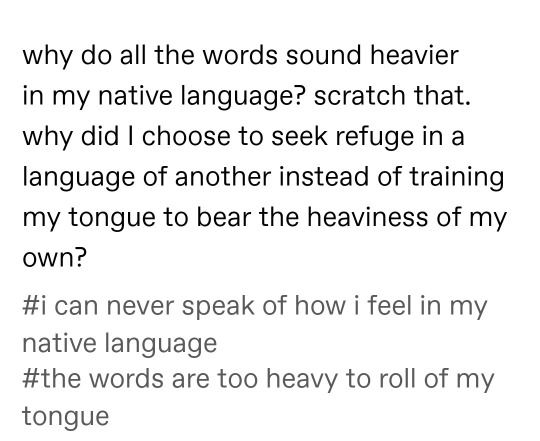
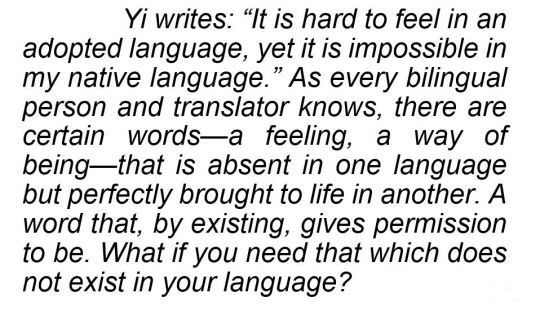
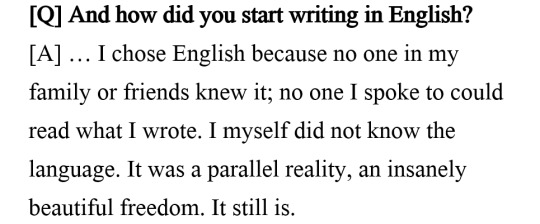
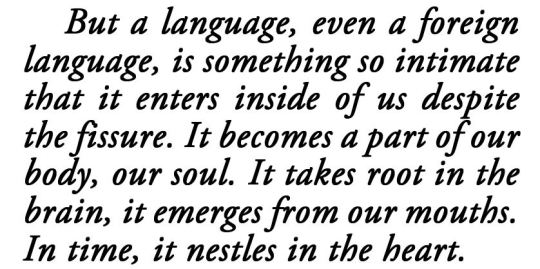
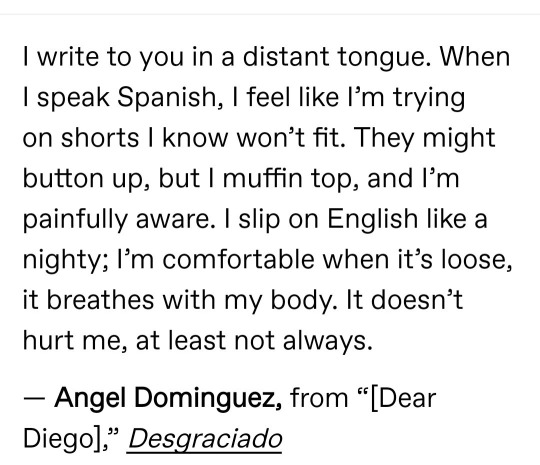
why do all the words sound heavier in my native language?
— @metamorphesque, Yoojin Grace Wuertz (Mother Tongue), Still Dancing: An Interview With Ilya Kaminsky (by Garth Greenwell), Jhumpa Lahiri (Translating Myself and Others), @lifeinpoetry
40K notes
·
View notes
Text

Joy Sullivan, from Instructions for Traveling West: Poems; “These Days People Are Really Selling Me on California”
13K notes
·
View notes
Text
You ever been in a state where you physically have no energy, but you're bored and socially understimulated so you kind of wish you could just invite people to come over like this:
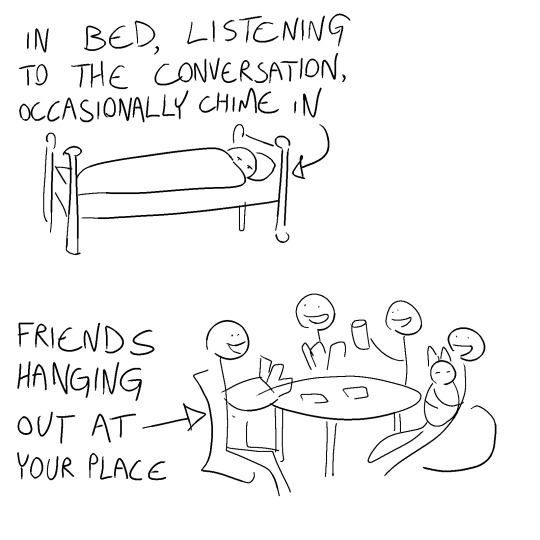
104K notes
·
View notes
Text
I spot the spark like a long lost child. What a light! A fiery glimmer of light, colored like a festival.
It's quiet — I can hear the magic. I can feel it, too, tingling the tips of my fingers as I reach out to yours. I have so much to say, and today, the thoughts in my head are brave enough to become words. But then, I pause.
My hand falters, and my words hesitate among each other at the tip of my tongue. It's as if the spark overheard them; it quietly dims. I have so many things to tell it, but the channel from my thoughts to my speech is treacherous, and new words can hear their braver peers bickering on the other side, forgoing their journey. How can I tell them to be brave again?
The spark is quiet, but I can sense its distress as it zaps my finger, feeble but unkind. I don't know how to soothe the spark, or my frazzled thoughts, or the words on my tongue, or my outreached hand.
I will mourn this lost treasure, a connection like magic flickering briefly before dying out. I am not afraid of burning, but I fear burning everything we've tentatively built together to the ground. I am full of electricity, and you are a beautiful chandelier — I just don't trust your fuses.
1 note
·
View note
Photo


Heather Havrilesky, How to Be a Person in the World
7K notes
·
View notes
Text
Repudiation
I have found myself in utmost darkness. Instinctively, my hand reaches out to you, only for you to flinch the moment my shaky fingers touch yours. The sharp movement cuts through the darkness and right through my soul.
You too, dearest Brutus?
It hurts — oh, it hurts so bad. It always hurts to die, but it's a different kind of pain when the knife that kills you is the one that once fit in your hand like a glove. That's how much you loved and trusted me, the way I know your dearest weapons so intimately. I wonder if they know me back, and the tears on your knife answer me — although the tears could very well be my own, I am reminded, as warm blood flows from a wound right below my eye socket.
Should I bother swallowing down the lump in my throat? Will it matter if I bleed or choke to death?
My soul is creeping through my ribs, and the drowsier I get, the clearer I can see you in my mind. As if life itself is what made it so foggy up here, not my fear of death. Right now, I can see you crystal clear. I reach out to you, and this time you don't flinch so sharply, but you do take a step back. I grip my fists, steady my breath, and beg.
"What have I done to be forsaken? Why is it a lie when I tell you I love you the most?"
You take a sharp breath and finally, finally look at me. I'd almost forgotten the warm amber of your eyes and the furrow of your brow. If this is how I die, spending my last moments acquainting myself with them once more, then so be it.
Tears are escaping your stoic resolve, and I can't help but ask again, "Why?"
You shake your head vigorously, and I feel the cold blade against my soul once more. "Don't act like you don't know."
That brings up a laugh, or a sob. What is there yet to know?
"You weren't there when I needed you — nobody was. What crime is it to burn an empty house down? Arson was never your hill to die on, Brutus."
You shake your head vigorously, "You, for God's sake! You were gonna burn with it!"
"Oh, so you'll make me bleed to death instead?"
"Idiot, you're not dying. Open your eyes!"
"My eyes are open. I can see you just fine."
"No, love. Open them — please."
I open my eyes, and —
Oh.
I don't exactly see it. That would be an understatement. Rather, I know it well, like you know an old friend, or the mole on your mother's chin. I don't see it, but I am looking at the world with eyes that lived it.
I see a world where I claim to be what I am not, and one in which that contradiction is celebrated. A world in which I cut fruit for your sworn enemies with your dearest knife. A world that glorifies fire, as if everything beautiful and fearless is a deity to be worshipped.
A world that burned you, my darling, through your core, but blinded me with the smoke so I couldn't see you dying.
I truly, truly love you, Brutus, but it's a ghost of you I chased while you waited so patiently, so loyally.
"It's the end of your wait, now, huh?"
I close my eyes, and find you still there. This time, your hand reaches out to mine.
"You're back though, aren't you?"
1 note
·
View note
Text
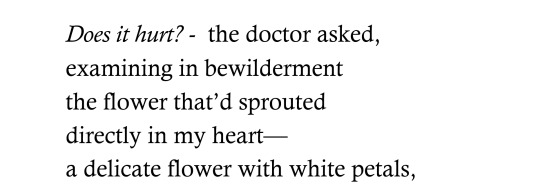









"Does it hurt?", Hovhannes Grigoryan (translated by Tathev Simonyan)
3K notes
·
View notes
Photo

Beauty by Jordan Bolton
Order my new book ‘Blue Sky Through the Window of a Moving Car’ here - https://smarturl.it/BlueSky
2K notes
·
View notes
Text

I've been reading the Complete Poems of Samuel Taylor Coleridge, and as wonderful as he was, he had an excessive fondness for a certain punctuation mark. So, me being me, I decided to have a little fun with it. Enjoy.
TEXT:
A SONNET: TO THE EXCLAMATION POINT
O exclamation point! Most overused Throughout English Romantic poesy! I marvel at the way thou art abused In every ode and sonnet that I see!
O fair and noble punctuation mark! O ender of each sentence and each clause! When I encounter thee, a voice cries "Hark!", And I compel my reading eyes to pause,
Awaiting some dramatic turn of phrase To drive the shades of boredom all away: Lo! Here it comes! I startle with amaze! And yet, to thee I raise my voice and pray:
O herald of an overheated style, Could we get a question mark once in a while?
170 notes
·
View notes
Text
The Bladesmith
I have collected many knives They all know you rather well And I know you'd like to meet them, too But I love you too much To trust my blades with you So I hesitate
I bury my knives deep in my soul Safe and sound And walk around with a punctured heart The daggers keeping my blood at bay And shielding my wounds
I look at you; your eyes are closed You look so kind If I close my eyes, I am a sheath But do, tell me Can a sheath be slain by its own blade?
1 note
·
View note
Text

"The Brothers Karamazov", Fyodor Dostoevsky (translated by Constance Garnett)
10K notes
·
View notes




